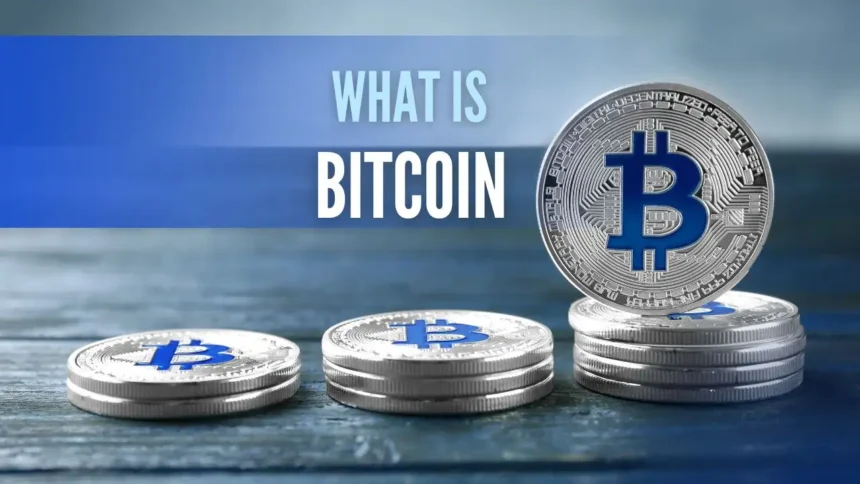In the vast tapestry of financial evolution, a new thread was woven in 2009, one that promised to redefine the very fabric of money and finance. This thread is Bitcoin, a digital currency that has stirred debates, ignited imaginations, and forged a path toward a decentralized financial future. But why does Bitcoin matter? And how does it shape the future of money and finance?

The Birth of Bitcoin
Bitcoin’s story begins with the enigmatic figure of Satoshi Nakamoto, whose identity remains shrouded in mystery. In 2008, Nakamoto published a white paper titled “Bitcoin: A Peer-to-Peer Electronic Cash System,” proposing a decentralized currency that would operate without a central authority. The following year, Bitcoin was born, quietly revolutionizing the world of finance.
Understanding Bitcoin
So, what exactly is Bitcoin? At its core, Bitcoin is a digital currency that enables peer-to-peer transactions without the need for intermediaries like banks. This is made possible by blockchain technology, a decentralized ledger that records all transactions across a network of computers, ensuring security and transparency.
Bitcoin vs. Traditional Currency
Unlike traditional fiat currencies, Bitcoin is not issued or regulated by any government. This distinction offers several advantages. Bitcoin transactions are borderless, allowing for seamless global transfers. Additionally, Bitcoin’s limited supply of 21 million coins ensures scarcity, protecting against inflation—a stark contrast to the often inflationary nature of fiat money.
The Evolution of Money
To appreciate Bitcoin’s significance, one must consider the evolution of money itself. From the barter system to the use of precious metals, and eventually to paper currency, money has continually evolved to meet the needs of societies. Today, we stand at the cusp of a new era, where digital currencies like Bitcoin are poised to become the norm.
The Decentralization Revolution
Decentralization lies at the heart of Bitcoin’s appeal. In a world where centralized institutions often wield disproportionate power, Bitcoin offers an alternative. It empowers individuals by eliminating the need for intermediaries, thus fostering a more equitable financial system.
Security and Transparency
Bitcoin’s security features are robust. Transactions are verified by network nodes through cryptography and recorded in the blockchain. This process ensures that transactions are immutable and transparent, fostering trust among users.
Bitcoin and Financial Inclusion
One of Bitcoin’s most profound impacts is its potential to promote financial inclusion. Traditional banking services are inaccessible to millions worldwide. Bitcoin, with its decentralized nature, provides an opportunity for the unbanked and underbanked to participate in the global economy.
Bitcoin as Digital Gold
Often referred to as “digital gold,” Bitcoin shares many attributes with the precious metal. It is a store of value, a hedge against inflation, and is increasingly seen as a safe-haven asset. Just as gold has been prized for centuries, Bitcoin is now being recognized for its enduring value.
The Role of Bitcoin in the Global Economy
Bitcoin’s influence extends beyond individual transactions. It has the potential to reshape global finance by offering an alternative to traditional banking systems. Its decentralized nature challenges the status quo, paving the way for a more inclusive and resilient financial ecosystem.
Challenges and Criticisms
Despite its promise, Bitcoin faces several challenges. Its volatility is a significant concern, with prices subject to rapid fluctuations. Regulatory hurdles also pose a threat, as governments grapple with how to classify and control this new form of currency. However, these challenges are not insurmountable and are part of the growing pains of a revolutionary technology.
Environmental Impact
Bitcoin’s environmental footprint has been a topic of intense debate. The energy consumption of Bitcoin mining is substantial, leading to concerns about its sustainability. However, efforts are underway to mitigate this impact, including the development of more energy-efficient mining technologies and the increased use of renewable energy sources.
Future Prospects of Bitcoin
Looking ahead, the future of Bitcoin appears promising. Predictions suggest continued growth and mainstream adoption, driven by increasing awareness and acceptance. As technological advancements unfold, Bitcoin’s role in the financial landscape is likely to expand, offering new opportunities and challenges.
Bitcoin and Technological Innovation
Bitcoin has not only revolutionized currency but has also spurred technological innovation. Blockchain technology, which underpins Bitcoin, has far-reaching implications beyond finance. It has the potential to transform various industries, from supply chain management to healthcare, by providing transparent and secure systems.
Conclusion
In conclusion, Bitcoin matters because it represents a paradigm shift in the way we perceive and interact with money. It embodies the principles of decentralization, security, and transparency, challenging traditional financial systems. As we move forward, Bitcoin’s significance will only grow, heralding a new era in the world of finance.
FAQs
What makes Bitcoin different from other cryptocurrencies?
Bitcoin is the first and most well-known cryptocurrency, with a finite supply of 21 million coins. Its decentralized nature and pioneering technology set it apart from other cryptocurrencies, which may have different features and use cases.
How can I start investing in Bitcoin?
To invest in Bitcoin, you’ll need to create an account on a cryptocurrency exchange, such as Coinbase or Binance. From there, you can purchase Bitcoin using traditional currency and store it in a digital wallet.
What are the risks associated with Bitcoin investment?
Bitcoin investment carries risks, including market volatility, regulatory changes, and the potential for hacking. It’s essential to do thorough research and only invest what you can afford to lose.
How does Bitcoin mining work?
Bitcoin mining involves solving complex mathematical problems to verify transactions on the blockchain. Miners are rewarded with new Bitcoin for their efforts, contributing to the network’s security and stability.
Can Bitcoin replace traditional money?
While Bitcoin has the potential to complement traditional money, it’s unlikely to replace it entirely. Instead, it may coexist with fiat currencies, offering an alternative for those seeking decentralized financial solutions.










nice content